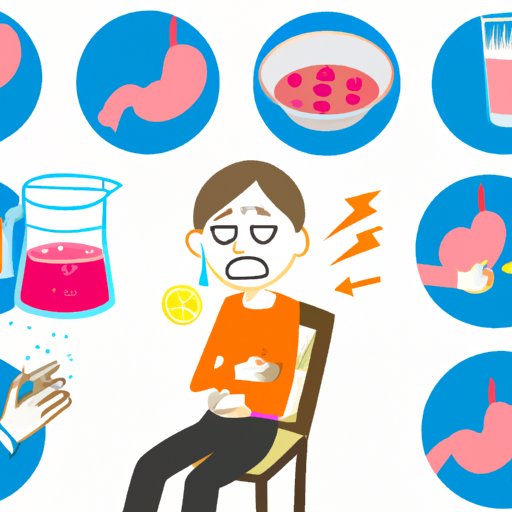Introduction
Nausea is an unpleasant feeling in the stomach that can lead to vomiting. It is often accompanied by other symptoms such as dizziness, sweating, and an accelerated heart rate. While it is usually short-lived and harmless, it can be a debilitating symptom if it persists. Fortunately, there are several steps you can take to reduce or prevent nausea.

Avoid Foods or Smells That Make You Feel Nauseous
Certain foods or smells can trigger nausea. Common triggers include strong odors, fried or greasy foods, spicy foods, and sweet or acidic foods. In addition, alcohol, caffeine, and cigarettes may cause nausea in some individuals. To avoid these triggers, it is important to identify which ones affect you and then try to avoid them.
Stay Hydrated
Drinking plenty of fluids can help reduce nausea. According to a study published in the journal Gastroenterology, dehydration can make nausea worse. Staying hydrated can also help prevent constipation, which can be another cause of nausea. Ways to increase your fluid intake include drinking water or other non-caffeinated beverages, eating juicy fruits or vegetables, and consuming soups or broths.
Eat Small, Frequent Meals or Snacks
Eating smaller, more frequent meals or snacks can help reduce nausea. Eating large meals all at once can overwhelm the digestive system and cause nausea. Instead, try eating smaller meals throughout the day. Healthy snack ideas include trail mix, yogurt, apples with nut butter, oatmeal with fruit, and whole grain crackers.

Get Plenty of Rest and Reduce Stress
Getting enough rest and managing your stress levels can help reduce nausea. Studies have shown that sleep deprivation can increase feelings of nausea. Additionally, high levels of stress can worsen nausea. Ways to reduce stress include deep breathing exercises, yoga, mindfulness meditation, and journaling.
Use Relaxation Techniques Such as Deep Breathing or Meditation
Relaxation techniques such as deep breathing and meditation can help reduce nausea. According to a study published in the journal Evidence-Based Complementary and Alternative Medicine, relaxation techniques can help reduce nausea in pregnant women. Examples of relaxation techniques include progressive muscle relaxation, guided imagery, and visualization.
Conclusion
Nausea can be a troublesome symptom, but there are steps you can take to reduce or prevent it. These include avoiding trigger foods or smells, staying hydrated, eating small, frequent meals or snacks, getting plenty of rest, and using relaxation techniques. By following these tips, you can help reduce your nausea and enjoy a healthier life.
(Note: Is this article not meeting your expectations? Do you have knowledge or insights to share? Unlock new opportunities and expand your reach by joining our authors team. Click Registration to join us and share your expertise with our readers.)
